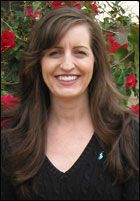
Professor Laurieanne Dent is a biologist and teacher who joined the Pepperdine faculty this year. But did you know she was also an expert on the uncommon specie of mormyrids. A specie of what? Well a fish, of course, arguably the strangest and most unique fish known to mankind.
Native to Africa, mostly in rivers, the mormyrid (pronounced more-my-rid) can also be found in lakes and other fresh water bodies. These fish are electric, but their current isn’t used for defense. In fact, it is so weak that you could stick your hand in the water and not feel the electricity.
Instead, their jolt is their navigation. They generate an electric field around them, like a force field. When they get too close to an object, it distorts the shape of the field, allowing them to know the location of that object. No wonder Dent is so fascinated with them.
Mormyrids also use their charge to communicate. “Imagine a heart monitor sending a pattern of pulses,” Dent explains. The sound made is clicking “like Morse Code, with each fish having a unique sound, like our voices,” she added.
Even more fascinating is that these creatures are sonic, meaning they sing. When Dent first heard them she was in the lab with a colleague, and they heard a strange noise emitting from the tank. They submerged a hydrophone into the water and heard their song. The males sing to the females by vibrating their swim bladder—a sack in their abdomen that fills with gas.
Dent never had the opportunity to work in the field in Africa, but was always perfectly content in the lab. If it weren’t for her time as a researcher, she would have never experienced the singing fish the way she did.
Dent first heard of the creatures while studying for her masters of science degree at the Sam Houston State University in Texas. Naturally, she was fascinated with the creature’s unique character, and launched her research career.
Her favorite kind of mormyrid is commonly known as Baby Whale. It is small, but similar to the sperm whale. It’s “dark charcoal grey coloring” is perfect for blending in with their surroundings, since they aren’t very fast.
Dr. Dent’s love for science began in her 9th grade science biology lab. She immediately grew attached to the fascinating intricacy of cell structure. Captured by its complex and coordinated behavior, she has loved every moment of her career in the lab.
But even before her freshman year, she still had an attraction to fish. As a child, she had an aquarium filled with fish named after “The Dukes of Hazard” characters. She adored the little guys, possibly another reason why she loves her job so much. She was addicted to animals. She also had a cute little puppy named Dexter, a Bichon Frisse, described as “fat poodles” and “happy little white dog.”
Dent spent her childhood moving quite often. She grew up in California, Canada, Louisiana, Oklahoma, and Texas. A life of several adventures.
She is having the time of her life. She held a research position in a lab and is now a professor at a university. Dr. Dent feels that life isn’t simply lab or the classroom — it’s both. Therefore, she prefers teaching her students using her previous lab position because it involves so much research, “the two build off each other” she explains.
Dr. Dent is inspired by people dedicated to solving the world’s problems. Those moving people who devote themselves to “free the oppressed, feed and clothe the poor, heal the broken, and protect the weak,” she explains.
Dent is a visiting professor of biology at Pepperdine. She can finally say she is living her dream, as she had always aspired to be a college professor. “I like older students,” says Dent. “They’re more on the same level.”
She especially enjoys being a mentor to young adults. Any younger and she feels more like a babysitter than a teacher.
Her students share the love she has for them. Morgan Soper, Pepperdine junior, talks of her appreciation of her “favorite professor, by far.” Soper is taking her principles of biology class, and simply adores Dr. Dent. “She is brilliant for one,” explains Soper in amazement. She really admires Dent’s faith and how she isn’t afraid to hide it. Dent prays every Tuesday before class to start the week.
Soper also praises Dent for her ability to help. Although she is intelligent, she isn’t intimidating, and is able to relate the subject to her students. Soper says she has been to Dent’s office multiple times. Dent is “extremely helpful.”
Outside of the classroom, Soper is still able to have a relationship with her favorite professor. Dent genuinely cares for her students, and Soper was shocked by it. Dent asks questions about her residents and sorority. They also attend the same church, Pacific Crossroads, which also brings them closer together. Soper is planning on keeping in touch with Dr. Dent in the future, when they no longer have a student-professor relationship.
Although she adores her job, she has plenty of time for play. Younger brother David Dent is amazed at her ability to transition after a long day of work to enjoying life. In her free time, Dent enjoys reading, visiting museums and playing piano. She “loves to have a good time, laugh, and has a certain kind of constant celebration of life,” David says. In a short amount of time, Laurieanne is ready to have fun and live life. No holding back.

